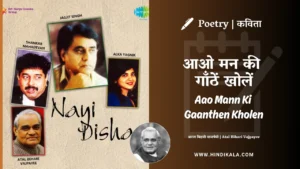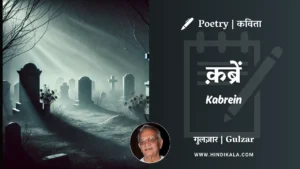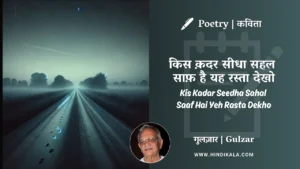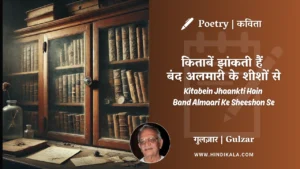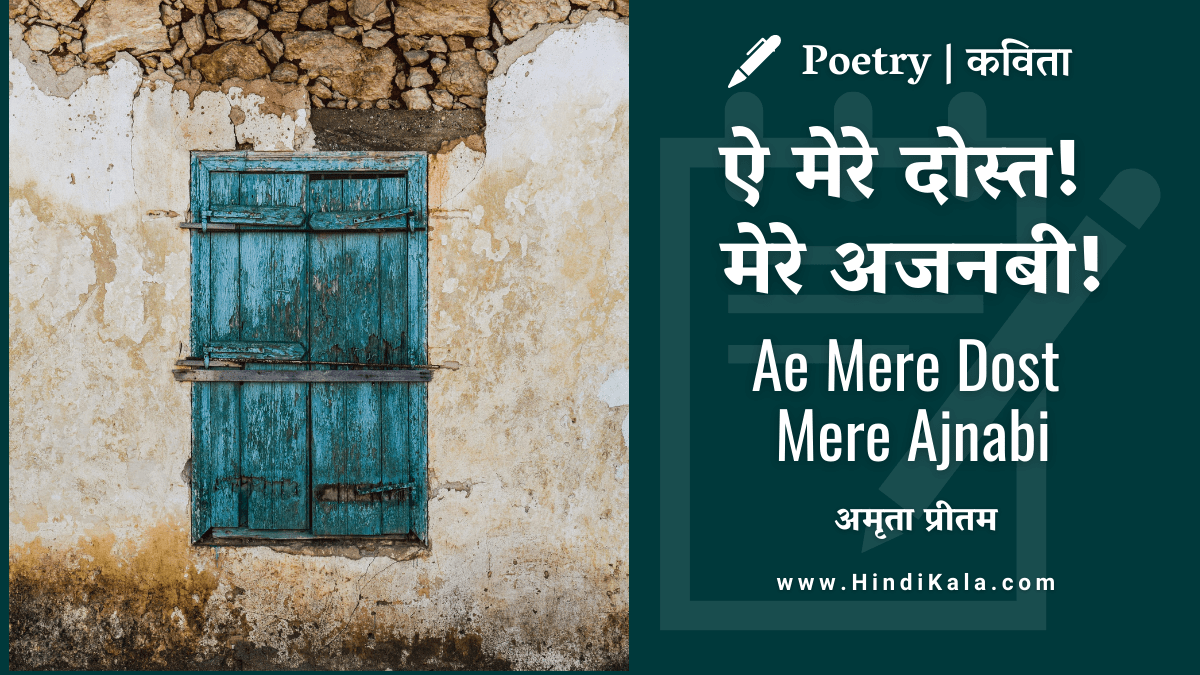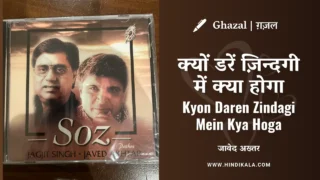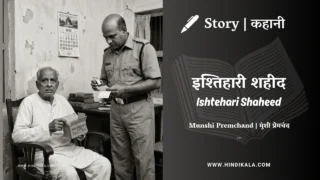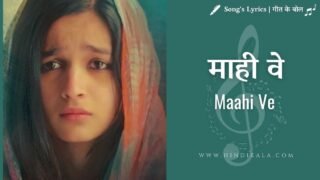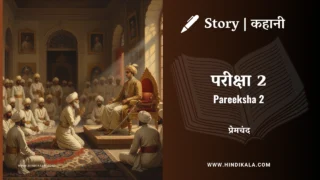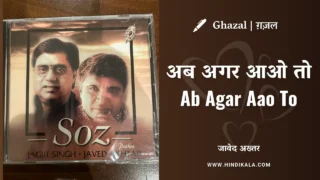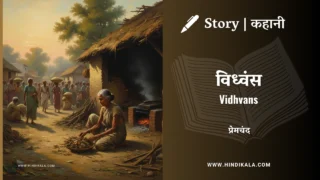Gulzar’s Poem Aaina – 1 in Hindi & English with Meaning (English Translation) | गुलज़ार – आईना – 1
Hindi Kala presents Gulzar‘s Poem Aaina-1 about the Interaction with a Mirror in Hindi & English with the poem’s Meaning (English Translation).
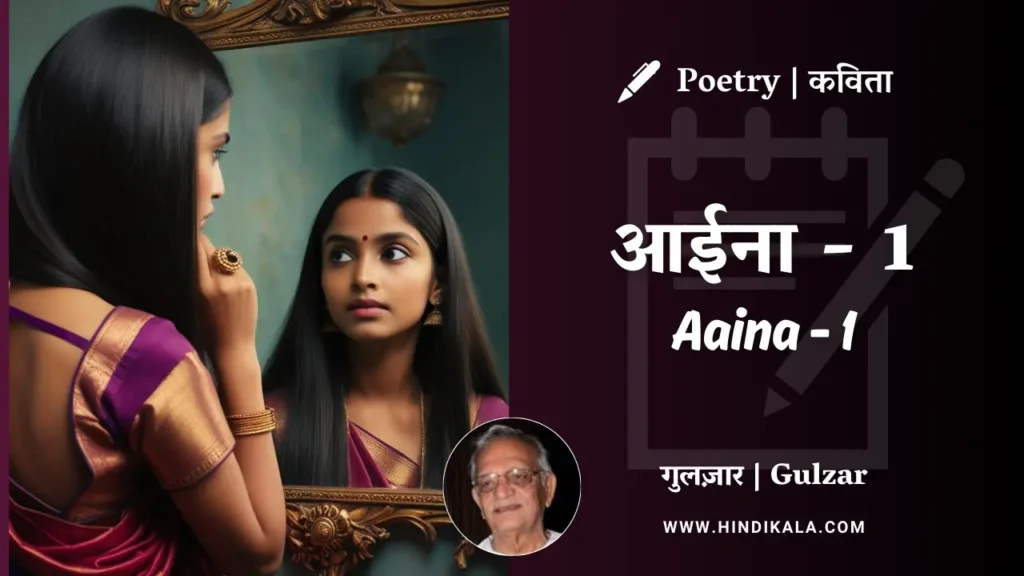
गुलज़ार की कविता आईना – 1
ये आईना बोलने लगा है,
मैं जब गुजरता हूँ सीढ़ियों से,
ये बातें करता है–आते जाते में पूछता है
“कहाँ गई वह फतुई तेरी
ये कोट नेक-टाई तुझपे फबती नहीं,
Ìये मनसूई लग रही है”
ये मेरी सूरत पे नुक्ताचीनी तो ऐसी करता है
जैसे मैं उसका अक्स हूँ
और वो जायजा ले रहा है मेरा।
“तुम्हारा माथा कुशादा होने लगा है लेकिन,
तुम्हारे ‘आइब्रो’ सिकुड़ रहे हैं
तुम्हरी आँखों का फासला कमता जा रहा है–
तुम्हारे माथे की बीच वाली शिकन बहुत गहरी
हो गई है”
कभी कभी बेतकल्लुफी से बुलाकर कहता है!
“यार भोलू,
तुम अपने दफ्तर की मेज़ की दाहिनी तरफ की
दराज में रख के
भूल आये हो मुस्कराहट,
जहाँ पे पोशीदा एक फाइल रखी थी तुमने
वो मुस्कुराहट भी अपने होठों पे चस्पाँ कर लो,”
इस आईने को पलट के दीवार की तरफ भी
लगा चुका हूँ,
ये चुप तो हो जाता है मगर फिर भी देखता है
Ìये आईना देखता बहुत है!
ये आईना बोलता बहुत है!!
Gulzar’s Poem Aaina – 1 in Roman Transcript
Yeh Aaina Bolne Laga Hai,
Main Jab Guzarta Hoon Seedhiyon Se,
Ye Baaten Karta Hai–Aate Jaate Mein Puchhta Hai
“Kahaan Gai Woh Fatui Teri
Yeh Coat Neck-Tie Tujhpe Fabti Nahi,
Ýeh Mansui Lag Rahi Hai”
Yeh Meri Surat Pe Nuktachini To Aisi Karta Hai
Jaise Main Uska Aks Hoon
Aur Wo Jaayja Le Raha Hai Mera.
“Tumhara Matha Kushada Hone Laga Hai Lekin,
Tumhare ‘aibro’ Sikud Rahe Hain
Tumhari Aankhon Ka Fasla Kamta Ja Raha Hai–
Tumhare Mathe Ki Beech Wali Shikan Bahut Gehri
Ho Gai Hai”
Kabhi Kabhi Betekallufi Se Bulaka Ke Kahta Hai!
“Yaar Bholu,
Tum Apne Daftar Ki Mez Ki Dahini Taraf Ki
Draj Mein Rakh Ke
Bhul Aaye Ho Muskurahat,
Jahaan Pe Poshidha Ek File Rakhi Thi Tumne
Wo Muskurahat Bhi Apne Hothon Pe Chaspa Kar Lo,”
Iss Aaine Ko Palat Ke Diwar Ki Taraf Bhi
Laga Chuka Hoon,
Ye Chup To Ho Jaata Hai Magar Fir Bhi Dekhta Hai
Ýe Aaina Dekhta Bahut Hai!
Ye Aaina Bolta Bahut Hai!!
Gulzar’s Poem Aaina – 1 Meaning (English Translation)
This mirror has started to speak,
As I pass by the stairs, it begins to critique.
“Where’s that casual charm of yours?
This coat and tie don’t suit you anymore,
They feel unnaturally forced.”
It critiques my face like I’m its reflection,
Measuring me with precise inspection.
“Your forehead broadens, but your brows shrink,
The gap between your eyes is on the brink,
And the wrinkle in the middle runs deep, don’t you think?”
Sometimes, casually, it calls out and says,
“My friend Bholu,
You left your smile in the right-hand drawer,
Where did you stash that secret file before?
Take it and paste it back on your lips once more.”
I’ve turned this mirror to face the wall,
It quietens down but still sees it all.
This mirror, oh, it watches so much,
And when it speaks, it speaks too much!)
Essence of the Poem
Through the viewpoint of someone who believes their mirror is criticising and making comments about their life, this poem explores a very introspective trip.
Key Themes:
Self-awareness and introspection: A person’s increasing awareness of their evolving appearance and feelings is highlighted by the mirror, which becomes a metaphor for self-reflection.
The aging process: The mirror’s observations about the speaker’s aging features evoke a sense of mortality and the passage of time.
Loss of innocence: The remark made by the mirror regarding the lost “foolishness” implies a desire for a more straightforward and carefree past.
The power of objects: The inanimate mirror takes on a life of its own and represents the speaker’s innermost feelings and concerns.
Interpretation:
The poem implies a pervasive uneasiness with growing older and the accompanying changes. The speaker is struggling with the loss of their youth and the prospect of their own mortality. The speaker’s evolving appearance is reflected in the mirror, which serves as a continual reminder of these changes.
The poem also discusses identity and how one views oneself. The way the speaker interacts with the mirror is a reflection of how they interact with themselves. The critical tone of the mirror raises the possibility that the speaker is being too harsh on themselves.
The poem, which examines themes of ageing, self-awareness, and time passing, is ultimately a meditation on the human condition. It challenges the reader to consider how they relate to their own reflection and the changes they go through in life.
You Might Also Like
Tags:


